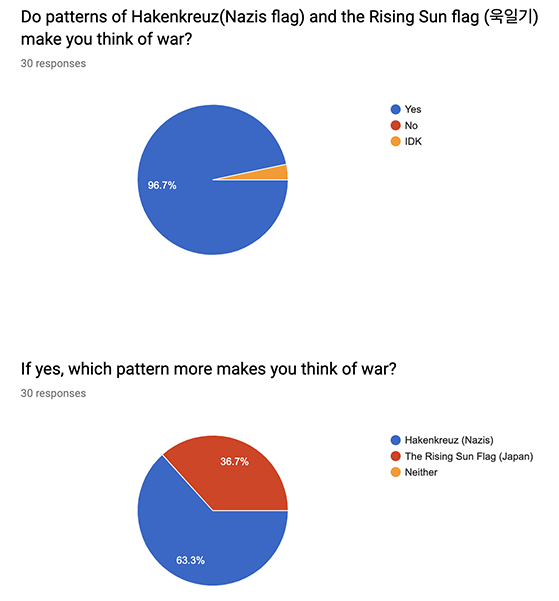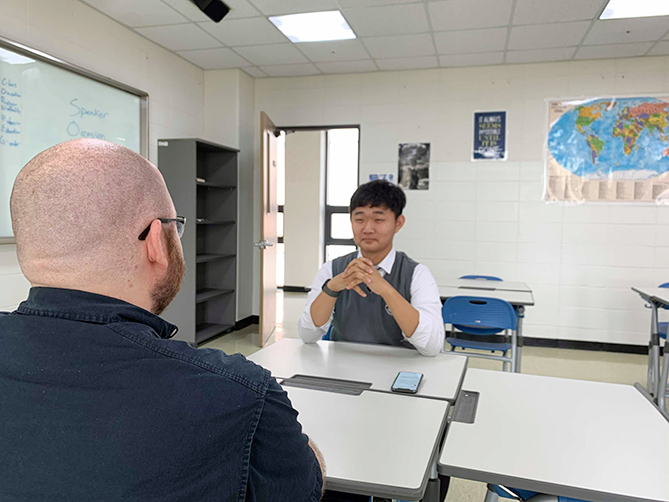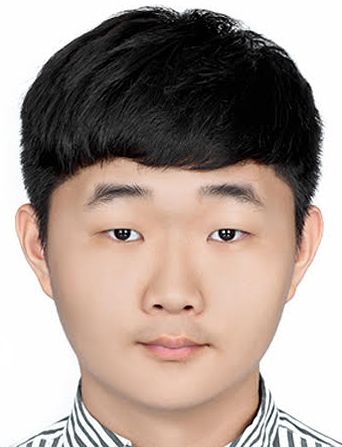It is now common to see Japanese sports fans supporting their athletes by wearing clothes or using flags imprinted with a “rising sun,” a design that was famously used by the Japanese military during World War II. Because of the mired history surrounding the rising sun pattern, controversy on whether sports fans are “allowed” to use such patterns occurs every year. Recently, the Abe administration has demonstrated a desire to usher in a second golden age for Japan through the 2020 Tokyo Olympic Games, which is inevitably connected to use of the rising sun flag during the first golden age (pre-World War II). There are several different opinions among Koreans and Westerners regarding the issue of sports fans using the flag.
First, I asked 10 adults who work at a medium-sized company, Bansuk Sports, and 10 high school students two questions: “Do the Hakenkreuz(pattern used by Nazi Germany during World War II) and the rising sun flag make you think of war?” and “If yes, which pattern reminds you more of war?”
For the first question, of the 10 respondents, nine answered that the patterns make them think of war, one said that the patterns do not remind them of war, and no one answered that they do not know. Likewise, of the 30 students, 29 answered yes, one answered no, and no one answered that they do not know.
For the second question, it differed between the adults and the students. Eight adults answered that the rising sun flag is more reminiscent of war: one answered that it was the Hakenkreuz. On the other hand, 19 students chose the Hakenkreuz while 10 chose the rising sun flag.
Even though this survey was not based on a huge sample, it led to a clear conclusion that the young generations of Korea think of war when they see the patterns. However, according to the data from the second question, high school students tend to consider Hakenkreuz more negative.

The research was based on the assumption that Koreans will have concrete ideas on both patterns very well, but the result says that the younger generation might not consider the Rising Sun flag as a war-criminal flag.
Benjamin Willis, a teacher of AP world history at Korea International School Jeju Campus, agreed to answer the following two questions for this article--How would you feel if you see Japanese sports fans using the rising sun flag, and why do you think that Japanese fans use the rising sun flags rather than the official national flag? (from the perspective of someone of a third-party nationality).

For the first question, he answered that the use of certain patterns can be very “powerful and meaningful.” Furthermore, he mentioned that it’s because “patterns stimulate people’s sight.” Willis noted that, from his perspective, even though the Rising Sun flag is undoubtedly a sensitive topic, Hakenkreuz and the Soviet Union’s flag is more meaningful, suggesting that Americans consider the use of the Rising Sun flag as a way to cheer on athletes rather than convey political ideas.
For the second question, Willis answered that the United States has a similar problem: the use of the flag of the southern states that was used during the Civil War. According to Willis, people who use the Civil War-era flag claim that they use the flag “not because they feel antipathy towards the certain groups but because it’s their heritage.” He then suggested that Japanese fans’ use of the rising sun flag might not have any political meaning. “Likely, the Japanese might use the rising sun flag because, for them, it’s their heritage rather than a political or military symbol. But it can’t be an excuse for the terrible things that the Japanese military did.”
This is still a controversy because some consider that the use of the flag can remind painful memories to the victims while some consider that the use of the flag doesn’t convey any political ideas.
Even though the Japanese government allowed fans to use the rising sun flag, people from the countries that went through significant damages due to the Japanese military are on the opposition of the use of the rising sun flag. With less than a year left in the Olympics, it seems that the both sides--people who disagree to the use of the rising sun flag and who agree to the use of the rising sun flag--need a compromise. The standard of compromise must be "world peace," which is the spirit of the Olympics.

Shinyong Park
Sophomore (Grade 10)
Korea International School Jeju Campus

